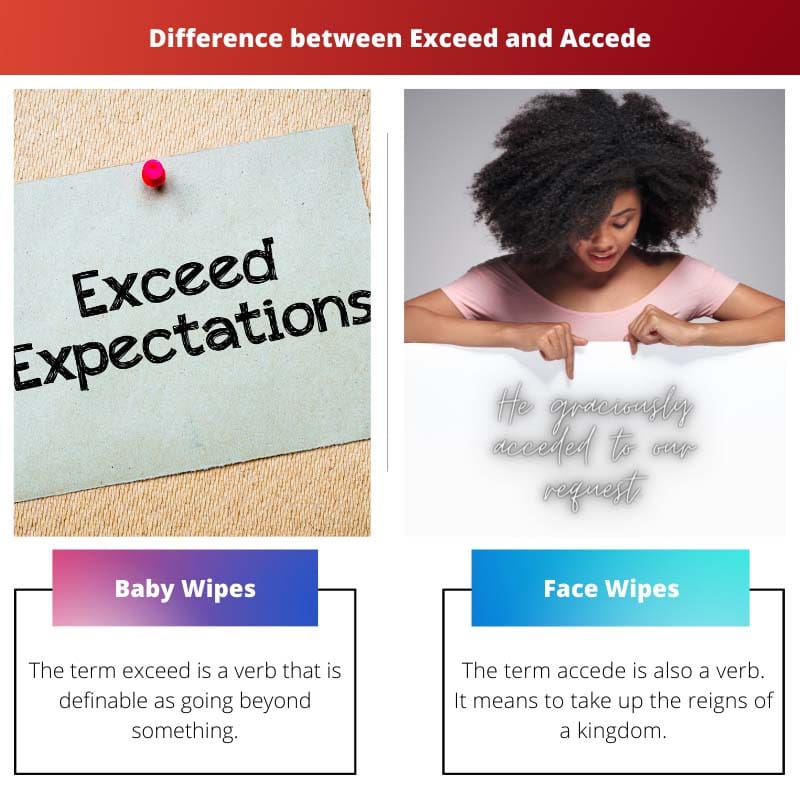The terms exceed and accede, are both verbs having a slightly similar pronunciation. However, the word exceed means to go beyond something.
The word ‘accede’ is definable as assuming a position of authority. Both of these words are pronounced differently in a phonetic way. When spoken daily, the terms tend to be pronounceable a bit similar.
Key Takeaways
- To exceed means to go beyond a certain limit, surpass expectations, or outperform, while to accede means to agree, consent, or give in to a request or demand.
- “Exceed” implies superiority or accomplishment, while “accede” implies compliance or yielding.
- Both words can be used in various contexts but convey different actions and outcomes.
Exceed vs Accede
The difference between the term exceed and accede, is that exceed is a verb that means to increase in something. On the other hand, the term accede is a verb that means assuming or inheriting power from a reigning authority. Both of the verbs also differ in the ways they are pronounceable.

The term exceed is a verb that is definable as going beyond something. It means to increase or go past a particular limit of something.
The action exceeding means breaking past the law and going beyond a permissible rule. For example, A person has to pay a fine for exceeding the speed limit.
The term accede is also a verb. It means to take up the reigns of a kingdom. It means to assume power and take up the position of authority.
An heir of a king accedes to the throne and rules the subjects. The action of acceding also takes place in democratic rulings during the change of power.
Comparison Table
| Parameters of Comparison | Exceed | Accede |
|---|---|---|
| Origin Language | The word originated from Latin and French verbs. | The word originated from a Latin verb. |
| Meaning of verb | To exceed means to go beyond a limit. | To accede means to assume a position of authority. |
| Alternate meanings | The word exceed means to outperform in something. | The word accede means to agree or consent. |
| Used in reference to | Expectations, assumptions, penalties. | Legal rights, power, agreement. |
| The number of pronunciations | It has only one pronunciation. | It has multiple pronunciations. |
What is Exceed?
The word exceed is an action word that means going beyond a limit. According to the dictionary, the basic definition of exceeding is to be more in number or increase in something.
When a person exceeds something, he goes beyond the law, rule, or norm.
The term exceed is derived from the Latin verb excedere, which means to go beyond. The word also shares its origin with the French word exceder, which also means surpassing something.
The word exceed can be useful in signifying the increase in something positive or negative. For example, The girl’s performance exceeded the expectations of the teachers.
The sentence uses the word exceed to indicate a positive increase or growth in something. Whereas, the term can be useful in implying the breaking of a rule as well. For example, She had to pay a fine due to the exceeding weight of her luggage.
The word exceeds also means to be better at something. It means to surpass or outperform the ability of someone. When a person exceeds at something, he is better at doing a particular task than someone else.
The word is widely used about expectations, capabilities, and assumptions.

What is Accede?
The word accede is a verb used to denote the assumption of power. The term is used in explaining taking up the position of authority.
When an heir accedes the throne of a kingdom, he attains the right to rule the subjects. The word accedes can also be used in reference to a democratic form of government.
The ruling party accedes to the position of the government. The noun form of the word is accession.
In other definitions, the term accede also means agreeing to a request or demand. When a person accedes to any legal demands, that person is in affirmation of the norms of the legalities.
It means approving a need. The opposite of the word accede are to refuse or to deny. The words consent, submit and agree are synonymous with the term acceding.
The word accede can be pronounced in two ways. It is pronounceable as ak-s-ee-d or uh-s-ee-d. The pronunciation of the word is different in British English and American English.
The word originates from the Latin verb accedere. The Latin word means to come forward or approach. The word later evolved into the English word accede, which means to agree to a demand. To accede also means to adhere to rules and regulations.
Main Differences Between Exceed And Accede
- The word exceed means to go beyond a limit, whereas the word accede means to agree to a demand.
- The alternate definition of exceed is to increase in number, whereas the word accede can also mean assuming power.
- The term exceed is derivable from the French word exceder, whereas, the word accede is derived from the Latin verb accedere.
- The term exceed is used in reference to expectations or penalties, whereas the verb accede is used for power and agreement.
- The word exceed has only one pronunciation in the American and British languages, whereas the pronunciation of the term accede differs in an American and British accent.

- https://www.grammar.com/exceed_vs._accede#:~:text=Exceed%20means%20to%20be%20larger,your%20request%20of%20leaning%20early.
- https://academic.oup.com/jla/article/1/2/459/859424?login=true
